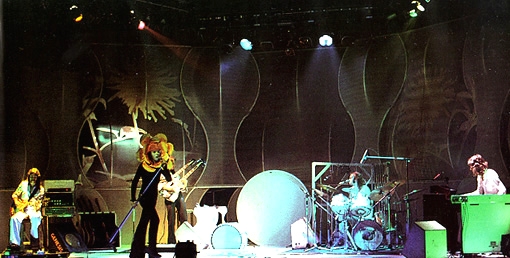/PAlogo_v2.gif) |
|
Post Reply 
|
Page <1 45678 9> |
| Author | |||||||||||||
OT Räihälä 
Forum Senior Member 

Joined: August 09 2005 Location: Finland Status: Offline Points: 514 |
 Posted: December 10 2011 at 07:00 Posted: December 10 2011 at 07:00 |
||||||||||||
It seems we do not really disagree on the structure, but end up with different conclusions. I consider art music as an ethos, because as an art music composer myself, I have to justify my work every time I start. I feel I should do that even if I made progressive rock, but if I wrote light ditties for pop singers, I wouldn't think of it as art, but rather as a way to get money.
In my opinion, popular music scene is in general far more conservative than the classical/art music field.
In a way this proves that some prog rock is part of art music: I can't imagine people doing concert performances of justinbiebers (or whatever they are) of this world in the 23rd century, because only true art survives the test of time.
 Edited by OT Räihälä - December 10 2011 at 07:01 |
|||||||||||||
 |
|||||||||||||
Dean 
Special Collaborator 

Retired Admin and Amateur Layabout Joined: May 13 2007 Location: Europe Status: Offline Points: 37575 |
 Posted: December 10 2011 at 05:23 Posted: December 10 2011 at 05:23 |
||||||||||||
The misundersting is not mine, it's standard Musicologist notation so it isn't their misunderstanding either. I have not denied that Progressive Rock is an art form, or is art, or is artistic music, or is music as art, after all are not all musicians called "artists", it is just not Art Music that's all.
Art Music is not an ethos, and since it covers 600 years of music development based upon traditional forms, it cannot be a style. There is an ethos behind that, but it is not an ethos in itself.
All Popular Music is art.
All Art Music is art.
Not all Popular Music is popular.
Not all Art Music is popular.
Popular Music is not Art Music.
Art Music is not Popular Music.
I never said it had to be more interesting to belong to Art Music - Stonie brought that up without qualifying it - I simply listed a few 20th Century composers whose work could be more interesting to me. I have said Art Music does not equate to "interesting" so even if Phaedra is more interesting to you than say Barber's String Quartet, Op. 11 (featuring the "popular" 2nd movement: Adagio For Strings) it does not change anything. Similarly, the "artistic value" of any piece of music is also immaterial to whether it is classified as Art Music or not, as is how adventurous it is.
With Classical Music you are referring to 600 years of music, of which only a narrow 70 year period is actually called Classical (Renaissance, Baroque, Classical, Romantic, 20th Century, Contemporary, 21st Century), which is why I prefer to use the noun Art Music as that includes non Western classical music forms as well. Beethoven is from the transition from Classical to Romantic, Furrer is Contemporary - they are not bundled together. In the Prog world there are people who get upset with the violent bundling together of disparate musicians from opposite ends of a 40 year history. The Classical world appears far more receptive to new ideas and forms than the Prog world is
The wiki article is heavily cited, follow those citation links if you wish. Traditional formal notation (staff notation) is impossible for electro-accoustic and avant garde music, but other forms of symbolic notation are used just as other notaion forms are used in non-Western classical music. Cage produced a "score" for 4"33'.
(This is why conductors are famous)
Misses the point I was making, but never mind, I'll run with it ;-)
With the increasing popularity of Tribute bands and cover versions I actually believe that Rock Music (not just Prog Rock) is breaking out of the definitive Performer/Recording trap and in 40, 100, 600 years there will be "tribute" bands performing Dark Side Of The Moon, Scenes From A Memory and Thick As A Brick as concert performances in the same way as modern symphony orchestras are Mahler, Beethoven and Bach tribute bands today.
Anything that keeps my brain ticking over is enjoyable to me.
Please note that at no time have I ever said that Prog Rock couldn't be or shouldn't be incorporated into the Art Music cannon - at the moment it just isn't and it is not our say-so that it should be - you may want to join an exclusive club, but the club would have to accept your proposal for you to be a member.
ps: sorry, I plucked The Brandenburg out of thin air without thinking - of course Bach never heard that played in his lifetime, in fact no one did and it wasn't a "hit" until much later - Bach was a poor example since he was not a performer as such, even the Goldberg Variations that were performed in his lifetime were not performed by him - Mozart would have been a better example perhaps - there's always room for the odd slip-up when typing forum posts in the heat of the moment. Edited by Dean - December 10 2011 at 05:47 |
|||||||||||||
|
What?
|
|||||||||||||
 |
|||||||||||||
OT Räihälä 
Forum Senior Member 

Joined: August 09 2005 Location: Finland Status: Offline Points: 514 |
 Posted: December 10 2011 at 03:49 Posted: December 10 2011 at 03:49 |
||||||||||||
The basic misunderstanding here is the concept that Art Music would be a style. It is not, it is an ethos. Of course you can veto to musicological classifications, but don't forget that the essential spirit of the arts is to move forward by breaking the "rules", which of course are not real rules, but rather mere conventions.
Popular music and Art music are not mutually exclusive. Why would they be? Not all pop tunes are piece of art, because they are not meant to be, but a few are because their creators have meant them to be. This is the question of ethos.
This is another misinterpretation. Phaedra doesn't need to be more interesting than all the names you mention to be a piece of art, and thus, belong to art music. That would be to classify a work "art music" depending on its artistic value (defined by - who?), and even on how adventurous it is compared with works that already belong to some certain canon. Here we also have to put the term "classical music" under scrutiny: there is little classical in the works of, say, post-WW2 moderninst composers. Art music is a good term for all progressive music of today, that seek for new areas. There are artistic works that may belong to the continuum of classical music, ethnic world music, jazz, popular music etc. It is a violent act to bundle together both L. v. Beethoven and Beat Furrer as classical music. I tend to think art music of recent decades is more related to to visual arts than to music of gone centuries.
You refer to Wikipedia as an authority at your own peril...  Not all art music is written down. There is for example a myriad of composers of electronic music who never write anything down, and a few of them can't even read music, because they've never had the need to. Not all art music is written down. There is for example a myriad of composers of electronic music who never write anything down, and a few of them can't even read music, because they've never had the need to.The question of a performance of CTTE vs. a Brandenburger by trained musicians doesn't belong to the question of art music. It is more a question of the reception of a piece of art. Brandenburgers became famous at the time when there were no recordings, and as 99,9% of classical music, there is a convention that whoever can perform them and claim that their performance is authentic. What comes to CTTE, there is only one authentic manifestation of it, and that is Yes's recording on the album by the same name. In the former case, a piece of art music is conceptually closer to other old works of performing art, like a play by Sophocles or Shakespeare. The recording of CTTE on the other hand is a piece of art in the same way as Andy Warhol's painting of Marilyn Monroe in different colours - you can reproduce it, but it will never be exactly the same as the original (unless it's a digital copy). And with a Brandenburger performance we can't say there's an original way of doing it, because even J.S. Bach himself never heard a performance of any of them. BTW, Dean, this discussion is very inspiring (although a bit too time-consuming...).
 Edited by OT Räihälä - December 10 2011 at 03:50 |
|||||||||||||
 |
|||||||||||||
rogerthat 
Prog Reviewer 
Joined: September 03 2006 Location: . Status: Offline Points: 9869 |
 Posted: December 09 2011 at 22:09 Posted: December 09 2011 at 22:09 |
||||||||||||
Amen, thank you. Adapting art music techniques to popular music does not make it art music itself. |
|||||||||||||
 |
|||||||||||||
The Dark Elf 
Forum Senior Member 

VIP Member Joined: February 01 2011 Location: Michigan Status: Offline Points: 12799 |
 Posted: December 09 2011 at 21:27 Posted: December 09 2011 at 21:27 |
||||||||||||
|
Progressive rock isn't necessarily pretentious. I don't think any band ever set out to make "pretentious" music (other than perhaps Emerson, Lake & Plamer
But I think pretention lies more within the individual than the band. Have you ever heard someone like Johnny Rotten or Kanye West pontificate on music? There are pretentious folks involved in all genres of music. Edited by The Dark Elf - December 09 2011 at 21:28 |
|||||||||||||
|
...a vigorous circular motion hitherto unknown to the people of this area, but destined
to take the place of the mud shark in your mythology... |
|||||||||||||
 |
|||||||||||||
Kazza3 
Forum Senior Member 

Joined: November 29 2009 Location: Australia Status: Offline Points: 557 |
 Posted: December 09 2011 at 19:19 Posted: December 09 2011 at 19:19 |
||||||||||||
|
Dean, your answers are, to me, continually accurate and intelligent, and I have enjoyed reading them.
|
|||||||||||||
 |
|||||||||||||
Zombiezilla 
Forum Newbie 
Joined: December 06 2011 Location: USA Status: Offline Points: 19 |
 Posted: December 09 2011 at 18:18 Posted: December 09 2011 at 18:18 |
||||||||||||
|
Prog is "Art Music," but then again, so is any music. Music is part of the arts, thereby making it "art."
I might be a good person for this discussion, as I mentioned previously I came to Prog from a Punk background. My favorite styles of music are Punk, Glam (Hanoi Rocks, not Poison), Rockabilly and Prog. I'm not so sure if people catch just how similar Punk and Prog are to each other. Most people look at Punk as being a bunch of mindless musicians, and though that might be the case some times, there is also incredible musicianship in Punk. A buddy of mine who is a drummer in numerous Death Metal band, and an amazing musician, always wrote off Punk. Then he heard BGK and changed his feelings. Amazing songwriting, and unreal drumming. So in the songwriting category, if it all comes down to flashy playing, then the Punks are guilty also.
If it comes down to thinking you are superior to everybody else, and what you are doing is the most important thing in the world, sorry, NOBODY touches the Punks. That is the essence of that whole dang movement. They believe that they are the only ones who knows what is good and truly great. Yup, I'm going to generalize because in this case it can be done. I've seen Punks beat the crap out of people just for liking music that they felt was inferior to theirs. I ran from the Punk movement because I was tired of the constant crap and arrogance within the movement.
As for Prog and the pretentious lyrics, I never understood that. If writing about the subjects that Proggies write about makes them pretentious, then we might as well call any author who writes any form of fiction pretentious.
I will say that Prog can be a little cheesy at times to the non-Prog person. Either that or just friggin' weird.
|
|||||||||||||
 |
|||||||||||||
Dean 
Special Collaborator 

Retired Admin and Amateur Layabout Joined: May 13 2007 Location: Europe Status: Offline Points: 37575 |
 Posted: December 09 2011 at 18:17 Posted: December 09 2011 at 18:17 |
||||||||||||
The Wikipedia article clearly states that Art Music covers all forms of Classical Music and while some musicologists disagree, most recognise that Art Music is written down and not passed on orally (ie traditional folk music) or by recordings (popular music). The litmus test for that would be a performance of Close To The Edge by any group of 5 trained musicians given equal reception as the same pieced performed by the "composers", while I'm sure in his day JS Bach was quite the crowd-puller, he didn't have to be in attendance at every performance of the Brandenburg for it to be a hit.
I don't know Klaus Schulze's X to comment on it, Wiki seems to want to tag it "Classical", though cynically that appears to be because it has an orchestra playing on it, but I say that without having heard it - other Prog performers have crossed-over to classical music, Karl Jenkins being the most successful and Mike Oldfield and Tori Amos being the most recent.
|
|||||||||||||
|
What?
|
|||||||||||||
 |
|||||||||||||
stonebeard 
Forum Senior Member 

Joined: May 27 2005 Location: NE Indiana Status: Offline Points: 28057 |
 Posted: December 09 2011 at 17:11 Posted: December 09 2011 at 17:11 |
||||||||||||
For the record I would list Phaedra, and similar pieces of electronic music, alongside any "great" pieces by those artists I have heard which you mentioned (Stravinsky and Ravel come to mind). And it personally holds my interest more The Firebird Suite, so take that for what you will. I'm willing to accept the hazy (to put it mildy) definition of Art music as long as pieces like Bach's Prelude in C are excluded. A lot of classical music is simple as all hell, and as long as we don't just lump all Mozart and all Bach and all whoever into it, then I'll accept that ok, The Ring of Nibelung can be art music whereas Close to the Edge, not so much. What about Klaus Schulze's X though? What specifically would make this album, or works, not Art Music? The drums? The compositionional style? (More on that matter, what type of composition does a piece have to have to be art music? Again, Wikipedia offers nothing so perhaps you know.) I'm very curious.
|
|||||||||||||
 |
|||||||||||||
thehallway 
Prog Reviewer 
Joined: April 13 2010 Location: Dorset, England Status: Offline Points: 1433 |
 Posted: December 09 2011 at 16:24 Posted: December 09 2011 at 16:24 |
||||||||||||
|
Pretentious is a word only ever used by people who, deep down, feel some kind of inferiority towards the subject they are attacking. For example, I doubt the Queen has ever called anybody pretentious, while many outspoken rock critics continue to use the word to describe any music they don't understand. And it's no bad thing that they don't understand certain music types, but it's bad that they blame the musicians for their personal inability to comprehend the music. In any case, pretentious doesn't even work as an adjective in music, because music itself cannot exude arrogance or elitism...... and if it seems to allude to it, as I said, that's the listener's idea that they've projected onto the sounds. I've never heard any musicians, in interviews or in their music, ever implying that their music is in any way superior to anything else. Some classical composers I suppose. But generally, people don't complain unless it's because they know the music is good but they just don't want it to be popular. If a band was overall just terrible, the critic would say so...... but the critic says pretentious when, for whatever cultural reasons, they don't want to like the music even though they can see that it is of a high-standard. |
|||||||||||||
 |
|||||||||||||
KingCrInuYasha 
Forum Senior Member 
Joined: September 26 2010 Location: USA Status: Offline Points: 1281 |
 Posted: December 09 2011 at 16:07 Posted: December 09 2011 at 16:07 |
||||||||||||
|
Kind of mixed feelings on this one.
On the one hand, yes it can be. I mean, really? Is something like The Myths And Legends Of King Arthur by Rick Wakeman really supposed to be on the same level as, say, Beethoven's Ninth Symphony? On the other, it can be totally exaggerated. What's so pretentious about instrumental prog like some of the stuff Wetton-era King Crimson used to do? Not helped by some of the more vocal opponents of the genre, especially those who like punk, who claim their genre was meant to deflate the "pretentiousness" rock and roll was going through at the time. I'm sorry, but when you have the same over enthusiasm that every other music fanbase has, it leads me to believe otherwise. |
|||||||||||||
|
He looks at this world and wants it all... so he strikes, like Thunderball!
|
|||||||||||||
 |
|||||||||||||
Dean 
Special Collaborator 

Retired Admin and Amateur Layabout Joined: May 13 2007 Location: Europe Status: Offline Points: 37575 |
 Posted: December 09 2011 at 15:21 Posted: December 09 2011 at 15:21 |
||||||||||||
|
^ Quite.
Again, music doesn't have to be popular to be Popular Music, just as folk music doesn't have to be traditional to be Traditional Music - these are just nouns naming three broad terms of music not adjectives to describe what the music actually is, just as Progressive is a noun naming a genre of music not an adjective to describe what the music does. It's okay for Yes, Schulze, Tangerine Dream, ELP, King Crimson and Renaissance to be decribed as Popular Music - it's not a derogatory term, it does not belittle their achievement or compositional skill, but to say that they are Art Music and therfore more closely allied to Classical Music than Pop Music is pretending that it is something that it is plainly not.
Close To The Edge is a good example of why Prog Rock is not Art Music - it is not a single piece of music, it is not structured or arranged in a classical music form, it is three rock songs
I love Phaedra, it's a wonderful, dark piece of music, but to say it is more interesting than most 20th Century Classical Music is something I could never say - you're putting that up against Sibelius, Satie, Holst, Stravinsky, Vaughan Williams, Rachmaninoff, Ives, Schoenberg, Ravel, Bartok, Prokofiev, Gershwin, Copland, Weill, Tippett, Shostakovich, Barber, Britten, Babbitt, Bernstein, Ligeti, Boulez, Gorecki and Delius to name but a few (and before I start listing the avant guard, electro-accoustic and minimalists composers, and the "film-score" composers like Morricone, Nyman and Davis). I am by no means a traditionalist, but I do like to think I am a realist.
|
|||||||||||||
|
What?
|
|||||||||||||
 |
|||||||||||||
Snow Dog 
Special Collaborator 

Honorary Collaborator Joined: March 23 2005 Location: Caerdydd Status: Offline Points: 32995 |
 Posted: December 09 2011 at 13:59 Posted: December 09 2011 at 13:59 |
||||||||||||
|
^ You see? Pretentious.
|
|||||||||||||
 |
|||||||||||||
stonebeard 
Forum Senior Member 

Joined: May 27 2005 Location: NE Indiana Status: Offline Points: 28057 |
 Posted: December 09 2011 at 13:51 Posted: December 09 2011 at 13:51 |
||||||||||||
|
I would wager a piece doesn't get to be called "Art Music" just because it was classical or jazz, and looking at the Wikipedia page doesn't clarify much. It's all very vague. I would think works like Tales from Topographic Oceans and "Close to the Edge" (song) straddle the line between art music and pop music, and pressed to choose one of the other art music fits better. And I was thinking today, works like Phaedra by Tangerine Dream and most of Klaus Schulze's repertoire are strictly art music, or classical music, just with synthesizers. In fact, I find them more interesting than most 20th centural "typical classical". The instruments, performance technique, composition, and notation is wildly new and innovative, and it would take an astonishing traditionalist to believe it's "popular music."
Edited by stonebeard - December 09 2011 at 14:08 |
|||||||||||||
 |
|||||||||||||
Dean 
Special Collaborator 

Retired Admin and Amateur Layabout Joined: May 13 2007 Location: Europe Status: Offline Points: 37575 |
 Posted: December 09 2011 at 13:27 Posted: December 09 2011 at 13:27 |
||||||||||||
Edited by Dean - December 09 2011 at 13:28 |
|||||||||||||
|
What?
|
|||||||||||||
 |
|||||||||||||
Catalani 
Forum Newbie 

Joined: December 09 2011 Location: Brazil Status: Offline Points: 17 |
 Posted: December 09 2011 at 13:20 Posted: December 09 2011 at 13:20 |
||||||||||||
|
I don't think so.
|
|||||||||||||
 |
|||||||||||||
OT Räihälä 
Forum Senior Member 

Joined: August 09 2005 Location: Finland Status: Offline Points: 514 |
 Posted: December 09 2011 at 13:15 Posted: December 09 2011 at 13:15 |
||||||||||||
Bollocks!  The crux of progressive rock is that it belongs to "art music" at the same time as it's also a part of popular music. The elementary purpose of progressive rock work is it to be a piece of art. The crux of progressive rock is that it belongs to "art music" at the same time as it's also a part of popular music. The elementary purpose of progressive rock work is it to be a piece of art.I could turn this upside down: Anyone claiming Progressive rock is just Popular Music and not a form of art is being pretentious.
|
|||||||||||||
 |
|||||||||||||
Dean 
Special Collaborator 

Retired Admin and Amateur Layabout Joined: May 13 2007 Location: Europe Status: Offline Points: 37575 |
 Posted: December 09 2011 at 12:13 Posted: December 09 2011 at 12:13 |
||||||||||||
|
^ Pretentiousness has nothing to do with accessibility, complexity or ambition. Music is pretentious if it is pretending to be something it is not or if the fans pretend it is something it is not. Anyone claiming Progressive Rock is Art Music and not Popular Music is being pretentious. |
|||||||||||||
|
What?
|
|||||||||||||
 |
|||||||||||||
Ivan_Melgar_M 
Special Collaborator 
Honorary Collaborator Joined: April 27 2004 Location: Peru Status: Offline Points: 19535 |
 Posted: December 09 2011 at 09:52 Posted: December 09 2011 at 09:52 |
||||||||||||
|
Prog is ambitious for the people who like it and willing to make a personal effort in the understanding.
Prog is pretentious for hose who want exclusively easy music to shake their booties. Pedro Calderon de la Barca (Classic Spanish writer) said in his book "La Vida es Sueño" (Life is Dream) “In this treacherous world Nothing is the truth nor a lie. Everything depends on the color Of the crystal through which one sees it” Of course in Spanish sounds better "En este mundo traidor, nada es verdad ni es mentira. Todo es según el color del cristal con que se mira" Iván
Edited by Ivan_Melgar_M - December 09 2011 at 09:56 |
|||||||||||||

|
|||||||||||||
 |
|||||||||||||
tamijo 
Forum Senior Member 
Joined: January 06 2009 Location: Denmark Status: Offline Points: 4287 |
 Posted: December 09 2011 at 09:20 Posted: December 09 2011 at 09:20 |
||||||||||||
|
Very pretentious critics postulating Prog is pretentious.
Hmm could i use that in a song
 |
|||||||||||||
|
Prog is whatevey you want it to be. So dont diss other peoples prog, and they wont diss yours
|
|||||||||||||
 |
|||||||||||||
Post Reply 
|
Page <1 45678 9> |
| Forum Jump | Forum Permissions  You cannot post new topics in this forum You cannot reply to topics in this forum You cannot delete your posts in this forum You cannot edit your posts in this forum You cannot create polls in this forum You cannot vote in polls in this forum |